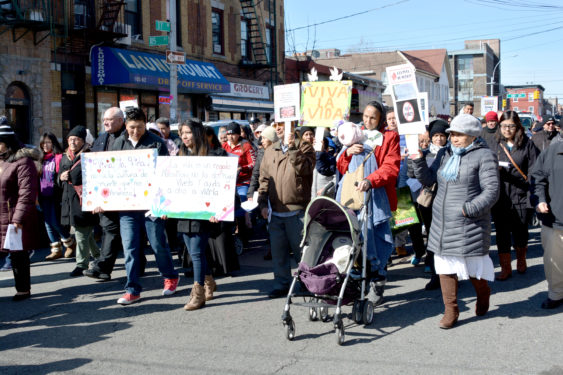By Jorge I. Dominguez-Lopez

On Saturday, April 21, more than 150 people attended 8 a.m. Mass at Our Lady of Sorrows Church in Corona. The Mass was the first step of the March to Celebrate Life (Viva la vida) the parish held that day.
While a march for life is usually identified with the defense of the unborn, this one had a broader scope.
“Our March to Celebrate Life is about the defense of the unborn, of course, but it includes much more,” said Father Raymond Roden, pastor.
In his homily, he reminded the faithful that while the defense of life starts with the fight against abortion, it should also oppose other manifestations of the culture of death, including the death penalty, euthanasia, war, economic injustice and human trafficking.
The organizers of the March to Celebrate Life asked several members of the parish to prepare a brief reflection on the six issues of the day. They also made signs, posters and flyers. After Mass, they walked in procession around the neighborhood, stopping every two blocks. It had the feeling of a Way of the Cross, but each ‘station’ was an opportunity for reflection and prayer about the culture of death issues.
Immediately after Mass, in front of the church, Father Roden explained the meaning of the march and then Maria Espinal talked about abortion. At different points along the way, speakers talked about the causes and effects of war (Milton Lopez), death penalty (Father Roden), economic injustice (Father Alvaro Flores), euthanasia (Milagros Fernandez) and human trafficking (Enrique Lugo).
Father Roden remarked that poor people and minorities receive the majority of death penalty sentences, which he called “legal revenge.” He explained that God, the Giver of life, is the only one who has the right to take it away.
Speaking in Spanish in front of an almost entirely Hispanic audience, he talked about the culture of violence and revenge so common in Latin American cultures.
In the same fashion, Enrique Lugo, while talking about human trafficking, reminded participants that prostitution is an ongoing scandal in areas of the neighborhood. Speakers provided concrete examples of issues relating to the march and their relevance for people of the parish.
The march this year was the second one organized by the parish. They had the first one in April of 2017.
“This idea came to me during a meeting of our parish pastoral team. We meet every Wednesday at the parish,” the pastor said. “I thought we needed to create a movement. Without forgetting the defense of the unborn, I thought, we need to do more. That was my inspiration. The pope recently talked about this too.”
Father Roden was referring to the recently published apostolic exhortation “Gaudete et Exsultate” (“Rejoice and Be Glad”) in which Pope Francis says:
“Our defense of the innocent unborn, for example, needs to be clear, firm and passionate, for at stake is the dignity of a human life, which is always sacred and demands love for each person, regardless of his or her stage of development. Equally sacred, however, are the lives of the poor, those already born, the destitute, the abandoned and the underprivileged, the vulnerable infirm and elderly exposed to covert euthanasia, the victims of human trafficking, new forms of slavery, and every form of rejection.”
At the end of the march, Father Roden asked participants to make it their own. “I might not be here tomorrow, but you will be the responsible for keeping this movement alive. It belongs to the parish now.”
